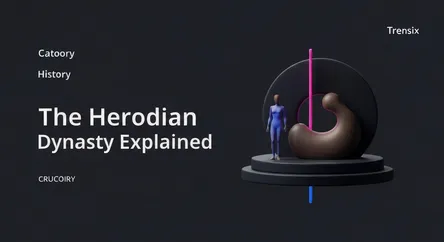History
The Herodian Dynasty Explained

Discover the Herodian dynasty, the Roman client-kings of Judea, known for grand architecture, political intrigue, and their role in biblical events.
What is it?
The Herodian dynasty was a royal family of Idumaean descent that ruled the Roman client state of Judea and surrounding regions from 37 BCE to circa 92 CE. Appointed by Rome, the dynasty's founder, Herod the Great, replaced the Hasmonean dynasty. Herod was known for his ambitious construction projects, including the massive renovation of the Second Temple in Jerusalem, the port city of Caesarea Maritima, and fortresses like Masada. His reign, however, was also marked by brutality and paranoia, leading to the execution of perceived rivals, including members of his own family. After his death in 4 BCE, his kingdom was divided among his sons into a tetrarchy.
Why is it trending?
The Herodian dynasty remains a subject of intense interest due to its significant role in a pivotal period of world history. The family's story is intertwined with the narratives of early Judaism and the emergence of Christianity, with several Herodian rulers, such as Herod Antipas, featuring prominently in the New Testament. Archaeological discoveries continually shed new light on their architectural achievements and the socio-political climate of their time. The dynasty's complex relationship with the Roman Empire and its Jewish subjects provides a compelling case study of client-state rule, cultural conflict, and the tensions that eventually led to the First Jewish-Roman War.
How does it affect people?
The Herodian dynasty profoundly shaped the political, religious, and physical landscape of ancient Judea. Their rule, backed by Roman power, was often unpopular with their Jewish subjects due to their foreign origins and promotion of Hellenistic culture. This created significant social and religious friction. Their grand building projects, while architecturally impressive, were funded by heavy taxes. The dynasty's most lasting impact is arguably its context for key biblical events, including the birth of Jesus Christ under Herod the Great and the execution of John the Baptist by Herod Antipas. Their legacy continues to influence religious history and our understanding of the Roman Near East.